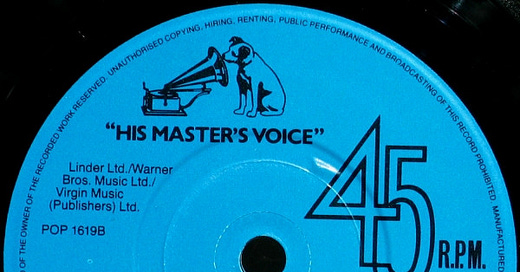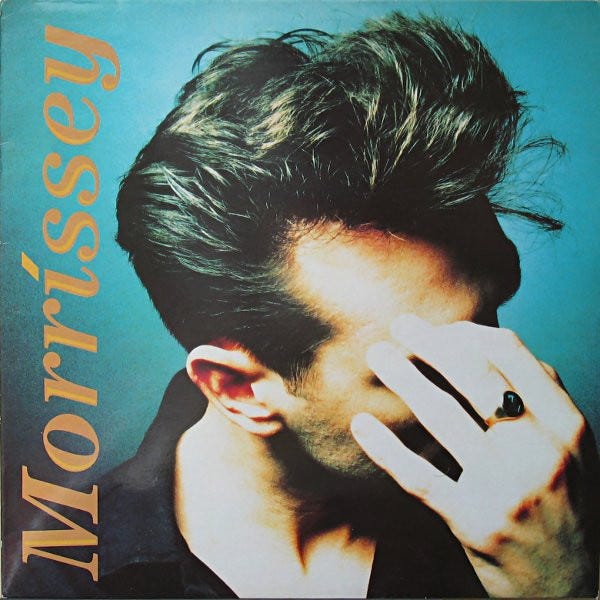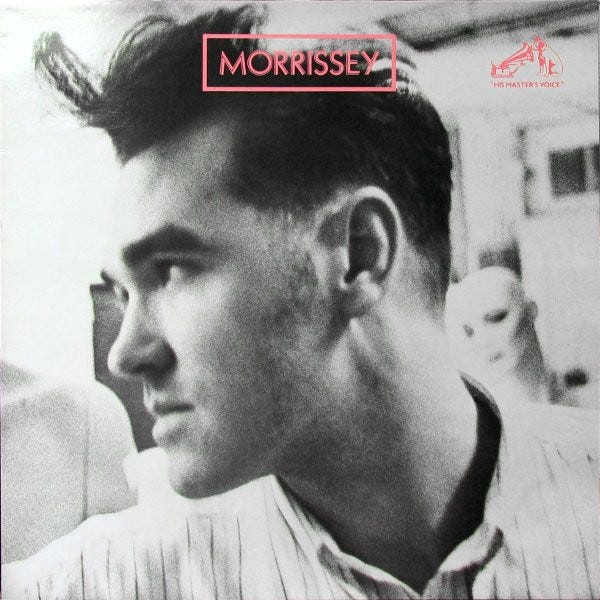One of the earliest songs Morrissey wrote after the breakup of the Smiths, ‘Disappointed’ acts as a cryptic emotional postscript to the band as a whole, and as a bittersweet elegy to Johnny Marr in particular. As with much of Morrissey's work, especially when it touches on his closely guarded emotions, the lyrics are rarely straightforward. To uncover their deeper meaning, one must read them with careful scrutiny and a sense for the subtext beneath the surface, which this post shall attempt to do.
The B-side to the ‘Everyday Is Like Sunday' single (Morrissey’s second), ‘Disappointed' was released on May 30, 1988. The single reached an impressive number nine on the UK Singles Chart.
Former Smiths' producer Stephen Street wrote the music for the song, which he presented to Morrissey in early 1988. According to producer Street, he had assumed that the recently dissolved band would reform and anticipated that his instrumental would eventually see the light of day as a Smiths song:
"Well initially, when the Smiths broke up I sent Morrissey a cassette of demos that I had, thinking that they could possibly be b-sides. I always thought that the band [the Smiths] would get back together in a few months. I got married that year and when I got back from my honeymoon there was a postcard waiting for me from Morrissey saying that he loved the ideas that I sent him and he wanted to do a solo record. So that’s how it started, and once I knew that he wanted a record I basically dropped everything else that was on at the time and put all my time into making lots and lots of home demo’s so I could provide him with a lot of material to be working at. At the time I felt we were honing it quite well, I mean if you consider that we didn’t really start our sessions for Viva Hate until October [1987] and that by Christmas it was all done and dusted. It was quite uncanny really how well it all worked out. It was hard work though."1
Morrissey recorded the song in March of 1988 during the session for the 'Everyday Is Like Sunday' single B-sides2 at Wool Hall Studios in Bath, England. The musicians on 'Disappointed' are Vini Reilly (guitar), producer Stephen Street (bass) and Andrew Paresi (drums).
Listen to ‘Disappointed’ here:
On July 15, 1991, a live recording of 'Disappointed' was released as a B-side to Morrissey's tenth single, 'Pregnant For The Last Time' (12-inch vinyl and CD formats). This live recording of the song is from Morrissey's concert in Utrecht, Holland on May 1, 1991 on the European leg of his Kill Uncle Tour.
It is striking how ‘Disappointed’ features guitar lines that echo the jangling style so closely associated with Johnny Marr. For a track so close on the heels of the dissolution of the Smiths, the resemblance feels too deliberate to be mere coincidence. If Morrissey was the emotional heart of the Smiths, then Marr was undoubtedly its musical soul - a dynamic this song seems to subtly acknowledge. The guitar’s familiar tone, coupled with the lyrical content, suggests a purposeful nod to the band’s legacy. It seems likely that its similarity is intended not only as a stylistic choice but as a way to amplify the song’s underlying message, evoking the spirit of the Smiths to deepen its emotional resonance.
Lyrically, ‘Disappointed’ is a reference to Johnny Marr’s departure from the Smiths, and Morrissey’s emotional fall-out not only from the bands breakdown, but also the fracture of his relationship with his friend and musical partner.
Our unsleepable friend
Gets the message on an ill wind
All your friends and your foes
Would rather die than have to touch you
To say the least, I'm truly disappointed
Truly, truly, truly, oh
Marr can be reasonably inferred to be the metaphorical “unsleepable friend” that Morrissey references at the outset of ‘Disappointed.’ Despite Morrissey’s professed detachment from Marr - he has, over the years, claimed there was never any emotional attachment, framing their association as purely artistic and professional—it is almost certainly more complicated than that. Indeed, such pronouncements verge on "the lady doth protest too much" overcompensation, especially given the layered and highly nuanced rapport Morrissey clearly shared with Marr, both professionally and personally.
It would not be unreasonable to attribute the creative intensity of Morrissey’s collaboration with Marr as being a consequence of his unrequited love for him —whether it was platonic or otherwise. In fact, Marr himself has said that his personal relationship with Morrissey was as close as is possible without being lovers. After
Keep reading with a 7-day free trial
Subscribe to Morrissey, Ringleader of The Tormentors to keep reading this post and get 7 days of free access to the full post archives.






